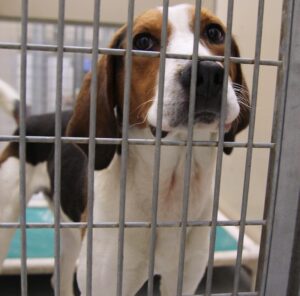
FDA and Beagles: Legislation to End Hidden Suffering in the Lab Gets One Step Closer
By Tamara Drake
Director of Research and Regulatory Policy, Animal Wellness Action and the Center for a Humane Economy
The beginning of the end to animal testing for new drugs is within our grasp.
With a remarkable assist from PETA and a long-term investigation of a contract-breeding facility, the U.S. Department of Justice deserves our praise for documenting a long list of animal welfare violations against Envigo, the second-largest supplier of animals to laboratories in our country.
The details outlined in the complaint are jarring:
- Only one veterinarian was assigned to “care” for 5,000 dogs
- 300 puppies were found dead from “unknown causes” in a six-month period
- 173 beagle puppies were dead and had already decomposed so badly that forensic work was impossible
- Management staff elected to euthanize animals rather than providing veterinary care for easily treatable injuries
- Some lactating beagles had no access to food.

Envigo maintains a breeding facility of 5,000 beagles sold mainly to pharmaceutical companies. It was issued more than 60 citations for non-compliance with the Animal Welfare Act in less than a year. (The AWA sets minimum standards for laboratory animals, while the USDA conducts inspections to ensure compliance.)
Envigo had been on notice for its animal-care failures since July 2021, but did not improve conditions for the animals. When the federal government got a warrant to enter the facility in mid-May, federal personnel seized 145 beagles in acute distress.
The mistreatment of beagles and other animal is the hidden backstory of drug development programs. The Federal Food, Drug and Cosmetics Act mandates animal testing for every new drug development protocol, translating into the use of perhaps millions of animals a year in our country. In short, you can draw a straight line from that law to the mistreatment of animals in breeding facilities such as Envigo.
The mistreatment of beagles and other animal is the hidden backstory of drug development programs.
Making matters worse, their suffering is virtually for naught, since it turns out that dogs are not good “models” when it comes to human disease. An analysis of the most comprehensive quantitative database of publicly available animal-toxicity studies suggests that dogs are highly inconsistent predictors of toxic responses in humans. Still, nearly 60,000 dogs are used for research each year in our country.
Thankfully, there is a strong effort in Congress to reboot the current drug development paradigm and allow scientists to use the best testing strategies. The FDA Modernization Act will allow patients to receive life-saving drugs and vaccines faster and at lower cost, because animal testing is more costly, slower and less reliable than alternative methods.
Democrat and Republican leaders in House and Senate health committees have agreed to include the FDA Modernization Act as a “rider” to a broader legislative package to reauthorize the Food and Drug Administration (FDA) user-fee agreements. On June 8, the House of Representatives passed this reform package with our FDA Modernization Act intact, and by a commanding vote of 392 to 28. The Senate’s action will come next.
It’s been 83 years of required animal testing, hindering the movement toward 21st-century human-based biology. The suffering and death of beagles, not only in labs but in obscure breeding facilities where awful things happen to animals every day, needs to end.
Other NLEC News

Making matters worse, their suffering is virtually for naught, since it turns out that dogs are not good “models” when it comes to human disease.